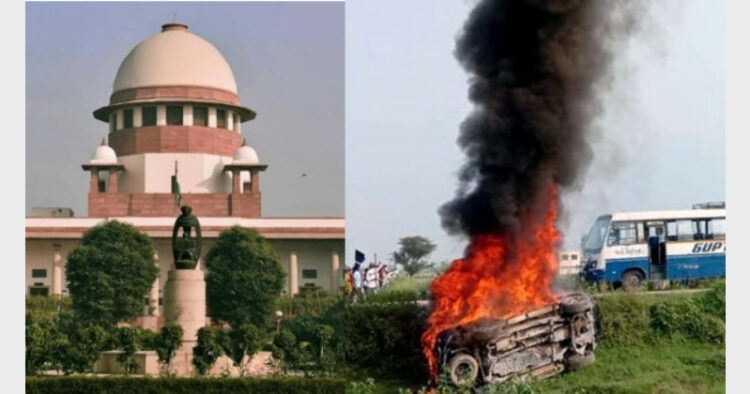The tragic incident of Lakhimpur Kheri that took place on October 3, 2021, consumed 8 precious lives and was deeply disturbing. Four protesting farmers were run over by a speeding vehicle, which later, as could be seen in the videos gone viral, were set on fire and some of the occupants of the vehicle(s), said to be four in number, were brutally attacked and lynched in broad daylight. The Supreme Court, it was reported earlier, had taken the suo-moto notice of the matter, but later it turned out that the matter was registered as a PIL based on a letter written by two lawyers.
In the case of Mahendra Lal Das V. State of Bihar (2002) 1 SCC 149, the Supreme Court reiterated that “It is true that interference by the court at the investigative stage is not called for. However, it is equally true that the investigating agency cannot be given the latitude of protracting the conclusion of the investigation without any limit of time.” In the Lakhimpur Kheri case, the incident had occurred only 6 days earlier to the date when the Supreme Court took cognizance, so the exception of a long delay, to the ground rule of non-interference by the court during the investigative stage, does not apply here.
In Divine Retreat Centre V. State of Kerala (2008) 3 SCC 542, where the High Court treated an anonymous petition sent directly in the name of a judge was proceeded upon under S. 482 of Cr.P.C., the Supreme Court held the High Court ought not to have entertained such a petition, it further held power under Art. 226 “is to be exercised in the rarest of rare cases where clear case of abuse of power and non-compliance with the provisions falling under chapter XII of the code, is made out requiring interference of the High Court. But even in such cases, the High Court cannot direct the police as to how the investigation is to be conducted, but can always insist for the observance of process as provided for by the Code”.
The crux of the legal position thus is that normally–the court is not to interfere in Police investigation, but this rule is subject to certain exceptions. Now let’s accept that it is the rarest of rare cases, justifying interference by the Supreme Court. In that case, the court can only insist on the observance of the process as provided in the Cr.P.C.; clearly, it does not extend to day-to-day monitoring of the investigation and certainly not to prodding and nudging the
police to arrest any particular accused.
In view, however, of the special powers of Supreme Court under Article 142 and 144 of the Constitution, taking cognizance of Lakhimpur Kheri may even be justified, but what is altogether baffling is the total lack of any interest whatsoever shown by the Hon’ble Bench concerned in monitoring the investigations regarding the accused who on videos were seen carrying out or aiding the carrying out of lynching of the perceived occupants of the vehicle.
The Supreme Court must have seen it by now that the U.P. government is deliberately putting the investigations of these accused on the back burner, as any action against these accused could raise an unwanted storm on behalf of the protesters. It is precisely for this reason, and it was expected that the Supreme Court should have directed its monitoring towards lynching accused as well. On the October 20 hearing, however, the Supreme Court made it known to Mr. Salve (as reported in “The Indian Express” dated October 21, 2021) that “the court was concerned with the first F.I. R regarding the death of farmers” only. The said observation is hugely disappointing, and it raises many questions. Is the CJI bench indicating that lynching of other four persons was no crime in the eyes of the Supreme Court? Do the hues of one’s political convictions decide the course of judicial monitoring? Is the Supreme Court not disregarding, with this approach, the mandate of Article 14 of the Constitution, which promises equal treatment before the law or the equal protection of the laws for all its citizens? Should the Supreme court not concern itself only with the fact of commission of an offence and the application of laws thereto, without paying any heed to the predilections of the media.














Comments